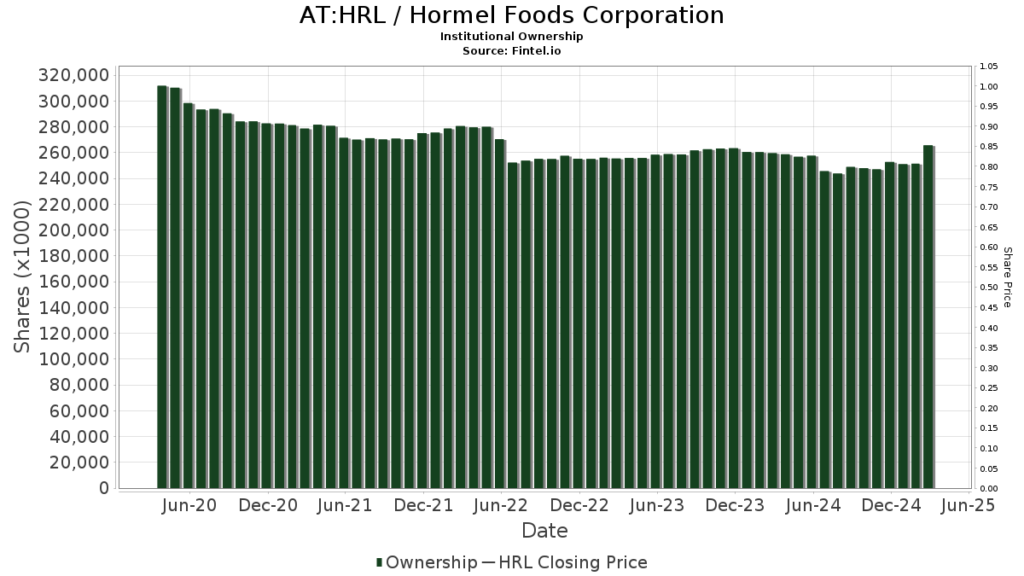Mixed Market Movement: Analyzing Recent Economic Trends and Trade Updates
The S&P 500 Index ($SPX) (SPY) closed down -0.17% on Tuesday, while the Dow Jones Industrials Index ($DOWI) (DIA) fell by -0.38%. In contrast, the Nasdaq 100 Index ($IUXX) (QQQ) rose by +0.18%. Additionally, June E-mini S&P futures (ESM25) decreased by -0.21%, whereas June E-mini Nasdaq futures (NQM25) increased by +0.15%.
Stock indexes experienced volatility, oscillating between gains and losses before settling in a mixed manner. Bank stocks provided a boost to the broader market, highlighted by a +3% increase in Bank of America due to better-than-expected Q1 net interest income reports. Furthermore, market sentiment improved with hopes that President Trump would take a gentler approach to his tariff policies. On Monday, President Trump mentioned considering temporary tariff exemptions on imported vehicles and parts, allowing auto companies more time to establish U.S. manufacturing operations.
Join 200K+ Subscribers: find out why the midday Barchart Brief newsletter is a must-read for thousands daily.
Lower U.S. Treasury note yields on Tuesday also supported equities, as the 10-year T-note yield dropped by -4.1 basis points to 4.333%. The decline followed remarks from Deputy Treasury Secretary Faukender, who indicated that potential changes to trading rules could reduce costs for banks. The Supplementary Leverage Ratio (SLR), established in 2018, applies uniformly to U.S. government debt without risk weightings. Banks contend that this capital rule curtails their ability to purchase Treasuries during times of stress, as they are treated similarly to riskier assets. Although the SLR was eased during the COVID crisis to enhance liquidity in the treasury market, it has since been reinstated.
The latest U.S. economic data came in better than anticipated, offering a positive outlook for stocks. The April Empire manufacturing survey reported a rise of +11.9 to -8.1, outstripping expectations of -13.5. Conversely, the March import price index ex-petroleum remained unchanged month-over-month, falling short of the projected +0.3% increase.
However, stock prices retreated from their peak levels on Tuesday, reflecting comments from European Union (EU) trade chief Sefcovic about the minimal progress made in resolving trade disparities between the EU and the U.S. The EU has proposed the removal of tariffs on industrial goods, including automobiles, but the U.S. has not accepted this offer. Further concerns about the escalating U.S.-China trade war limited stock gains as well. Notably, Boeing’s shares fell over -2% after reports indicated China had instructed its airlines to halt additional aircraft deliveries from Boeing. Also, the U.S. Commerce Department announced investigations into the national security implications of semiconductor and pharmaceutical imports, suggesting potential tariff impositions.
Comments from Atlanta Fed President Bostic on Monday evening indicated a preference for maintaining steady monetary policy. He noted the significance of understanding President Trump’s policies before any adjustments to interest rates could be considered.
On Friday, President Trump announced temporary exemptions for consumer electronics from reciprocal tariffs and a 10% global baseline tariff. However, a 20% tariff remains for electronics imported from China. Last Wednesday, he declared a 90-day pause on higher reciprocal tariffs affecting 56 nations while maintaining the new 10% baseline tariff on nearly all countries. The EU, in turn, announced a 90-day delay on implementing 25% tariffs impacting €21 billion worth of U.S. goods headed for Europe.
For the past five weeks, stocks have faced pressure due to concerns that U.S. tariffs would hamper economic growth and corporate earnings. On March 4, President Trump imposed a 25% tariff on Canadian and Mexican goods and raised the tariff on Chinese imports from 10% to 20%. On April 2, he signed a proclamation to implement a 25% tariff on U.S. auto imports, targeting vehicles and parts manufactured outside the U.S. Mr. Trump stated these tariffs were “permanent” and expressed no intent to negotiate exceptions. As of April 5, a 10% baseline tariff for nearly all nations was enacted. In retaliation, China increased tariffs on all U.S. goods to 125%, up from 84%, as a response to U.S. tariffs that reached 145% on Chinese goods.
These tariff issues have weakened the dollar and propelled gold prices higher. The dollar index recently fell to a three-year low, while gold reached an all-time high. Market participants are anxious about the implications of U.S. trade policies, which have adversely affected consumer confidence and led many companies to halt capital spending plans, adversely impacting GDP growth. Additionally, the dollar is under scrutiny as foreign investors reconsider their dollar-denominated assets in light of tariff strategies that may threaten its reserve currency status.
This holiday-shortened week will focus on updates regarding U.S. trade policy. Coming up on Wednesday, March retail sales are forecasted to rise by +1.4% month-over-month, with March retail sales excluding autos expected to increase by +0.4% month-over-month. March manufacturing production is predicted to improve by +0.3% month-over-month. Furthermore, Fed Chair Powell is scheduled to address the Economic Club of Chicago about the economic outlook. On Thursday, March housing starts are anticipated to decline by -5.7% month-over-month to 1.416 million, with March building permits expected to decrease by -0.6% month-over-month to 1.450 million.
The probability of a -25 basis point rate cut following the May 6-7 FOMC meeting is currently estimated at 20%.
Q1 earnings reporting season commenced last Friday, as major U.S. banks unveiled their results. According to Bloomberg Intelligence, the consensus anticipates Q1 year-over-year earnings growth of +6.7% for S&P 500 companies, a decrease from earlier projections of +11.1% recorded in November. Projections for full-year 2025 corporate profits for the S&P 500 are now set at +9.4%, down from January’s forecast of +12.5%.
In international markets, the Euro Stoxx 50 advanced by +1.20% on Tuesday. Similarly, China’s Shanghai Composite gained +0.15%, while Japan’s Nikkei 225 increased by +0.84%.
Interest Rates
June 10-year T-notes (ZNM25) closed up +10.5 ticks on Tuesday. The 10-year T-note yield dropped by -4.1 basis points to 4.333%. T-notes benefitted from indications of easing price pressures, as the March import price index excluding petroleum rose less than anticipated. Additionally, gains in T-notes were influenced by the potential regulatory changes suggested by Deputy Treasury Secretary Faukender, which may reduce trading costs for banks and enhance liquidity in the treasury market.
Nevertheless, T-note gains are constrained by persistent weakness among 10-year German bunds.
Market Update: Bond Yields Mixed as Stocks Show Positive Momentum
Comments from Atlanta Fed President Bostic on Monday created downward pressure on T-notes. He indicated a preference for maintaining current interest rates, citing uncertainties surrounding U.S. trade policies.
European Bond Market Overview
On Tuesday, yields in the European bond market presented a mixed picture. The 10-year German bund yield increased by +2.3 basis points, reaching 2.534%. Conversely, the 10-year UK gilt yield declined by -1.2 basis points to settle at 4.648%.
Eurozone Economic Data Highlights
Industrial production in the Eurozone for February showed a notable increase of +1.1% month-over-month, surpassing expectations of +0.3%. This marks the largest growth in six months.
However, the German ZEW survey for April revealed a sharp drop in economic growth expectations, falling by -65.6 points to a 1.75-year low of -14.0, significantly lower than the anticipated figure of 10.0. Market swaps are now pricing in a 97% chance of a -25 basis point rate cut from the ECB at its policy meeting on April 17.
U.S. Stock Market Movers
On Tuesday, bank stocks saw gains, led by a +3% increase in Bank of America (BAC). The bank reported Q1 net interest income of $14.44 billion, which surpassed the consensus estimate of $14.36 billion. Also seeing gains, Wells Fargo (WFC) ended up more than +2%, while Citigroup (C), Morgan Stanley (MS), Huntington Bancshares (HBAN), Fifth Third Bancorp (FITB), KeyCorp (KEY), and M&T Bank (MTB) all closed up more than +1%.
Rocket Lab (RKLB) experienced a significant surge, closing up more than +10% after being selected to offer hypersonic test launch capabilities through development programs in both the U.S. and U.K.
In other notable moves, Hewlett Packard Enterprise (HPE) rose by more than +5% following Elliott Investment Management’s announcement of a $1.5 billion stake acquisition. Netflix (NFLX) increased over +4% after a report from the Wall Street Journal suggested that the company aims to double its revenue and reach a $1 trillion market capitalization by 2030.
MercadoLibre (MELI) closed up more than +3% after Benchmark Co. initiated coverage with a buy rating and a price target set at $2,500. Meanwhile, KKR & Co (KKR) saw an increase of more than +1% after HSBC upgraded the stock from hold to buy, citing a price target of $119.
On the downside, Allegro Microsystems (ALGM) declined by more than -9% following ON Semiconductor’s withdrawal of its $6.9 billion acquisition offer.
Significant Declines in Major Stocks
Boeing (BA) led the decliners in the Dow Jones Industrial Average with a drop of more than -2% after reports surfaced that China had instructed its airlines to halt deliveries of Boeing jets. Dow Inc (DOW) fell by more than -3% after Bank of America Global Research downgraded its rating to underperform from buy, setting a price target of $28.
Howmet Aerospace (HWM) followed suit, closing down more than -2% following a downgrade from Wells Fargo Securities to equal weight from overweight. Bristol Myers Squibb (BMY) also sank by over -2% after announcing a failed late-stage trial for its heart disease drug, Camzyos. Air Products & Chemicals (APD) lost more than -2% after a downgrade by Bank of America Global Research to underperform from neutral.
Earnings Reports Scheduled for April 16, 2025
Upcoming earnings reports include Abbott Laboratories (ABT), Alcoa Corp (AA), Bank OZK (OZK), Citizens Financial Group Inc (CFG), Commerce Bancshares Inc/MO (CBSH), CSX Corp (CSX), First Horizon Corp (FHN), First Industrial Realty Trust (FR), FNB Corp/PA (FNB), Kinder Morgan Inc (KMI), Progressive Corp/The (PGR), Prologis Inc (PLD), Rexford Industrial Realty Inc (REXR), Synovus Financial Corp (SNV), Travelers Cos Inc/The (TRV), and US Bancorp (USB).
On the date of publication, Rich Asplund did not have (either directly or indirectly) positions in any of the securities mentioned in this article. All information and data in this article are solely for informational purposes. For more information, please view the Barchart Disclosure Policy here.
The views and opinions expressed herein represent those of the author and do not necessarily reflect the views of Nasdaq, Inc.


